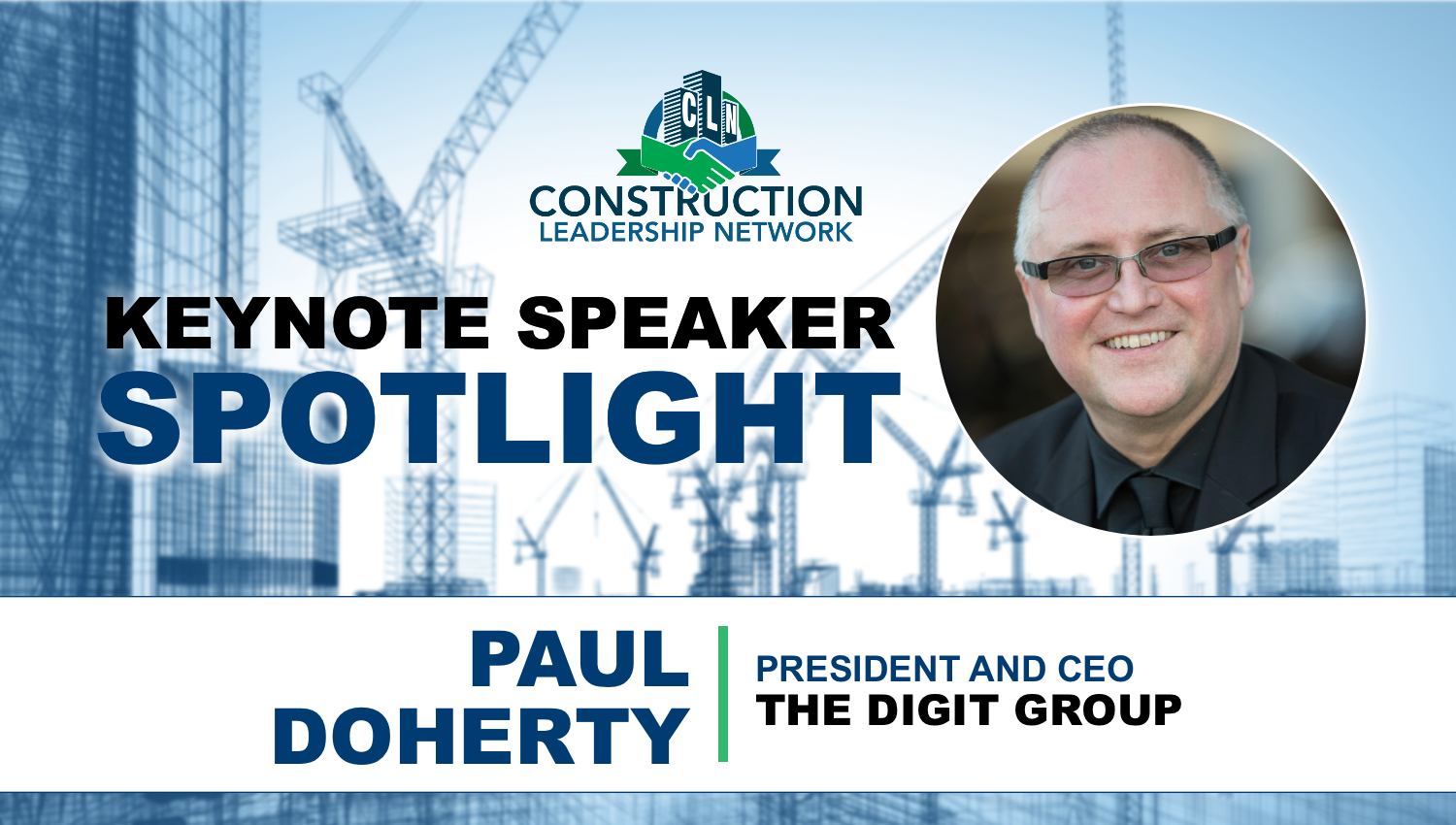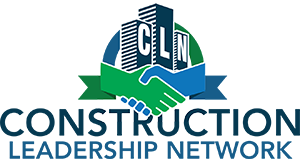
In an era of rapid change and economic uncertainty, small and mid-sized construction companies are facing unprecedented challenges. High interest rates, inflationary fallout, labor shortages—you name it; the construction industry landscape is shifting faster than ever.
Yet, in times of change lies opportunity. Adaptation, innovation, collaboration—these are the keys to not just surviving but thriving in this new environment. This is where the Construction Leadership Network (CLN) 2024 Annual Conference in Coral Gables, FL, comes into play.
One of the leaders attacking these challenges on a national level is this year’s keynote speaker, Paul Doherty. Paul is the CEO and founder of the digit group, inc., a real estate development company specializing in smart cities.
With more than three decades of experience, he has been at the frontier of integrating cutting-edge technology into the built environment. His work crosses various sectors, including healthcare, energy, education, and transportation, always with a focus on improving the human condition through thoughtful urban design and technological innovation.
A prolific author and speaker, Paul has written extensively on the future of construction and urban development. His recent book, “The Metaverse and the Built Environment,” explores the transformative potential of virtual and augmented realities in shaping our physical world.
We sat down with Paul to discuss his thoughts on the evolution of the construction industry, the role of technology in shaping our future, and what attendees can expect from his keynote address at the upcoming CLN Conference Sept. 16-18 at the Loews Coral Gables Resort.
CLN: Can you tell us a little about the digit group and its focus?
Paul Doherty: The digit group is a real estate development group that provides design, construction, and delivery at scale. We’re known for our work related to smart cities, but our approach goes beyond just implementing technology. We believe that everything is connected to everything else, which allows us to paint pictures and tell stories that resonate with everyone from a country’s leaders to the workers on the ground.
One of our key differentiators is that we start with people first. We employ cultural anthropologists to understand the wants and needs of the people in a particular area. Our goal isn’t just to build cities; it’s to create urban environments that, over time, people develop emotional attachments to. This approach allows us to address urban challenges and create solutions that truly improve people’s lives.
CLN: What’s your main focus at the moment?
PD: Right now, I’m involved in several exciting projects that are reimagining various aspects of urban life. We’re working on decentralized innovations like molecular-level water treatment, which uses technology similar to what’s used on the International Space Station. We’re also deeply involved in autonomous public transportation projects, which are changing how we think about urban layout and design.
One project I’m particularly passionate about is our work in healthcare and wellness. We’re collaborating with major institutions like the MD Anderson Cancer Center, the Mayo Clinic, and the Cleveland Clinic to democratize healthcare knowledge and create more effective, patient-centered systems.
Most recently, I’ve been working on taking what I know about built environments and, as part of a nationwide initiative, building a system with assistive technologies that will help people with disabilities do their jobs better and enable them to contribute in more meaningful ways. We’re partnering with companies like Amazon and Apple to create these technologies which will absolutely improve work environments. This project is not just about accommodating disabilities; it’s about finding ways to be a better human community.
CLN: What drew you to speak at the CLN conference?
PD: I’ve been involved with industry networks for many years, including the Associated Builders and Contractors (ABC) and the Design Futures Council. When I learned about the Construction Leadership Network, I was immediately impressed by their authenticity and genuine desire to improve the industry.
What really resonates with me is CLN’s goal of fostering leadership across all levels of the construction industry. They recognize that valuable insights and innovations can come from anywhere – from highly educated professionals to those who entered the field through hands-on experience. This approach aligns perfectly with my belief that leadership and innovation aren’t confined to any particular role or background.
CLN: Can you give us a sneak preview of what you plan to speak about as the keynote speaker at CLN?
PD: My keynote will cover several themes, all centered around how we can use storytelling to create the future in a balanced way – neither utopian nor dystopian. I’ll be exploring practical applications of technologies that are transforming our industry.
For instance, I’ll explain how “digital twins” are revolutionizing project management and collaboration are. Digital twins are virtual replicas of physical devices that data scientists and IT pros can use to run simulations before actual devices are built and deployed. They are also changing how technologies such as the internet of things, artificial intelligence, and analytics are being optimized.
We’ll also look at how blockchain is being used for smart contracts, potentially changing the economics of construction projects. I’ll also dive into the real potential of AI in construction, showing how tools like SpecGPT can drastically improve efficiency in reading and understanding construction specifications.
One of the most exciting topics I’ll cover is the concept of the metaverse and how it relates to the construction industry. We’re using avatars as interfaces to virtual construction sites, which allows for 24/7 project management and decision-making. This isn’t science fiction – it’s technology we’re implementing right now.
CLN: You recently published a book about the metaverse for the built environment. Will you be incorporating concepts from that in your talk?
PD: Absolutely! While the full metaverse isn’t here yet, we’re seeing its building blocks come together in exciting ways. In my talk, I’ll be expanding on some of the concepts from the book, showing how virtual worlds, digital twins, AI, and blockchain are converging to create new possibilities in construction and urban development.
I’m particularly excited to discuss the gamification of the industry. We’re using deep fake technology and AI to create digital representations of team members that can continue working and making decisions in the virtual space even when the physical person is off-site. This has huge implications for project continuity and global collaboration.
CLN: What are your thoughts on AI and its impact on the construction industry?
PD: AI is a broad term that encompasses various technologies like agents, large language models, machine learning, and GPT. In construction, AI can be incredibly useful for everyday tasks. For example, AI tools can analyze lengthy specifications and highlight the most important or unique aspects, saving time and improving accuracy.
I believe we’re moving towards what’s called singularity, where AI will become inseparable from our work processes. This isn’t something to fear – it’s an opportunity. By handling mundane tasks, AI will free us up to focus on more insightful, creative aspects of construction and design.
However, it’s crucial that we approach AI adoption thoughtfully. It’s not about replacing human workers; it’s about augmenting our capabilities and allowing us to work more efficiently and creatively.
CLN: What message do you hope attendees will take away from your keynote?
PD: I hope attendees will leave with a sense of excitement about the future of our industry. The technologies we’re discussing – AI, digital twins, the metaverse – they’re not just buzzwords. They’re tools that can help us build better, more sustainable, and more human-centric environments.
But more than that, I want to inspire a mindset of continuous innovation and collaboration. The construction industry has the power to shape the world we live in. By embracing new technologies and ways of thinking, we can create urban environments that truly enhance people’s lives.
I’m looking forward to engaging with the CLN community and hearing their perspectives. After all, the future of construction isn’t something any one person or company can shape alone – it’s a collaborative effort, and that’s what makes events like the CLN Conference so valuable.
The future of construction isn’t just about tomorrow—it’s about solving challenges today. For small and mid-sized contractors facing unprecedented hurdles, the CLN 2024 Conference offers more than just a glimpse of what’s to come. It offers actionable strategies you can bring back and implement immediately.
